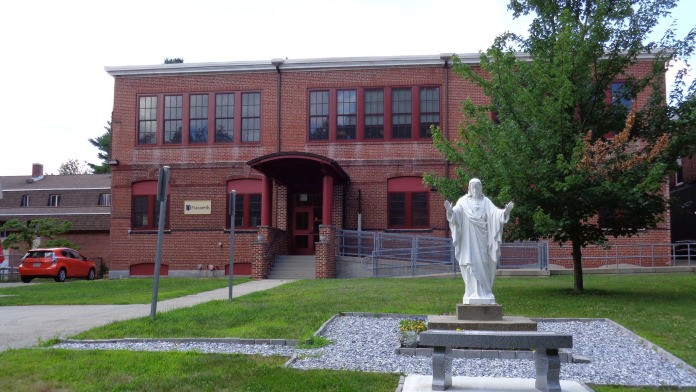About McAuley Nazareth Home for Boys
McAuley Nazareth Home for Boys is a residential facility that helps young boys between the ages of six to 18 who are struggling with behavioral health issues. It’s located in Leicester, Massachusetts.
While substance use disorder (SUD) may be treated here, they are not the priority. Instead, the emphasis is on supporting youth who are struggling with their behavioral health as a result of trauma, abuse, family issues, and neglect.
Voluntary admissions are accepted and this facility also accepts referrals from state agencies, social services, and foster care systems. McAuley is near Worcester and is also close to popular outdoor spaces like Rochdale Park and Greenville Pond. You can also easily access scenic woodlands and natural areas in the central Massachusetts region.
Intensive Residential Support
For some children, time away from common stressors is essential to help them rebuild and recalibrate their mental health. This stability can help people focus on what’s most critical so they can better learn how to manage triggers that might otherwise lead to mental health crises.
Academic Emphasis
Because this is a residential facility for young people, McAuley provides academic instruction as part of their daily routine to ensure that patients don’t fall behind and are on track with Massachusetts educational standards upon release.
Therapy is a central focus while enrolled here. Clients will also build life skills as well as develop critical mental health tools to help them manage life’s stressors.
The campus is set in a rural region to help children focus on their recovery. There are plenty of recreational facilities to allow for healthy outlets. Most people who attend McAuley Nazareth Home for the Boys are placed through state agencies that manage payment arrangements.
Rehab Score
Gallery


Other Forms of Payment
Medicaid is a state based program that helps lower-income individuals and families pay for healthcare. Medicaid covers addiction treatment so those enrolled can use their coverage to pay for rehab. When a program accepts Medicaid the client often pays very little or nothing out of their own pocket.
Addiction Treatments
Levels of Care
Residential treatment programs are those that offer housing and meals in addition to substance abuse treatment. Rehab facilities that offer residential treatment allow patients to focus solely on recovery, in an environment totally separate from their lives. Some rehab centers specialize in short-term residential treatment (a few days to a week or two), while others solely provide treatment on a long-term basis (several weeks to months). Some offer both, and tailor treatment to the patient's individual requirements.
Treatments
Many of those suffering from addiction also suffer from mental or emotional illnesses like schizophrenia, bipolar disorder, depression, or anxiety disorders. Rehab and other substance abuse facilities treating those with a dual diagnosis or co-occurring disorder administer psychiatric treatment to address the person's mental health issue in addition to drug and alcohol rehabilitation.
Mental health rehabs focus on helping individuals recover from mental illnesses like bipolar disorder, clinical depression, anxiety disorders, schizophrenia, and more. Mental health professionals at these facilities are trained to understand and treat mental health issues, both in individual and group settings.
Clinical Services
Cognitive Behavioral Therapy (CBT) is a therapy modality that focuses on the relationship between one's thoughts, feelings, and behaviors. It is used to establish and allow for healthy responses to thoughts and feelings (instead of unhealthy responses, like using drugs or alcohol). CBT has been proven effective for recovering addicts of all kinds, and is used to strengthen a patient's own self-awareness and ability to self-regulate. CBT allows individuals to monitor their own emotional state, become more adept at communicating with others, and manage stress without needing to engage in substance abuse.
Whether a marriage or other committed relationship, an intimate partnership is one of the most important aspects of a person's life. Drug and alcohol addiction affects both members of a couple in deep and meaningful ways, as does rehab and recovery. Couples therapy and other couples-focused treatment programs are significant parts of exploring triggers of addiction, as well as learning how to build healthy patterns to support ongoing sobriety.
Dialectical Behavior Therapy (DBT) is a modified form of Cognitive Behavioral Therapy (CBT), a treatment designed to help people understand and ultimately affect the relationship between their thoughts, feelings, and behaviors. DBT is often used for individuals who struggle with self-harm behaviors, such as self-mutilation (cutting) and suicidal thoughts, urges, or attempts. It has been proven clinically effective for those who struggle with out-of-control emotions and mental health illnesses like Borderline Personality Disorder.
Experiential therapy is a form of therapy in which clients are encouraged to surface and work through subconscious issues by engaging in real-time experiences. Experiential therapy departs from traditional talk therapy by involving the body, and having clients engage in activities, movements, and physical and emotional expression. This can involve role-play or using props (which can include other people). Experiential therapy can help people process trauma, memories, and emotion quickly, deeply, and in a lasting fashion, leading to substantial and impactful healing.
Research clearly demonstrates that recovery is far more successful and sustainable when loved ones like family members participate in rehab and substance abuse treatment. Genetic factors may be at play when it comes to drug and alcohol addiction, as well as mental health issues. Family dynamics often play a critical role in addiction triggers, and if properly educated, family members can be a strong source of support when it comes to rehabilitation.
Group therapy is any therapeutic work that happens in a group (not one-on-one). There are a number of different group therapy modalities, including support groups, experiential therapy, psycho-education, and more. Group therapy involves treatment as well as processing interaction between group members.
In individual therapy, a patient meets one-on-one with a trained psychologist or counselor. Therapy is a pivotal part of effective substance abuse treatment, as it often covers root causes of addiction, including challenges faced by the patient in their social, family, and work/school life.
Trauma therapy addresses traumatic incidents from a client's past that are likely affecting their present-day experience. Trauma is often one of the primary triggers and potential causes of addiction, and can stem from child sexual abuse, domestic violence, having a parent with a mental illness, losing one or both parents at a young age, teenage or adult sexual assault, or any number of other factors. The purpose of trauma therapy is to allow a patient to process trauma and move through and past it, with the help of trained and compassionate mental health professionals.
Staff
Sonya Abdien
President & CEO
Paul O’Connor
Chairperson
Lisa Leone, RN, BSN
Vice Chairperson
Wesley Cotter
Treasurer
Mary Bartholomew
Director
Sarah Rose Cavanaugh, PhD
Director
Cynthia Henderson
Advisor
Donna Mastrovito
Advisor
Contact Information
77 Mulberry street
Leicester, MA 01524